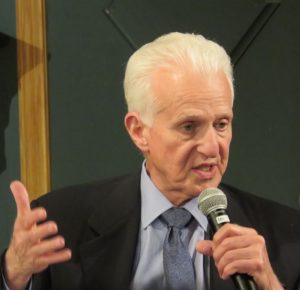What Is the Cabaret Community Doing to Combat Racial Inequality?
Sparked by the killing of George Floyd on May 25, an unprecedented outpouring of protests against our nation’s systemic racism got every one of us thinking more urgently about racial inequality. We now understand that we all have the responsibility to act—both personally and professionally—as anti-racism agents of change.
Earlier this summer, I wrote about how performers of color perceive and feel about the “whiteness” of the New York cabaret scene. (Read it here.) So now I’m wondering:
What are we doing, or planning to do, to combat that problem?
How can our cabaret stages serve as platforms for progress toward social justice?
To get some ideas about what’s being done to address these concerns, I spoke with three influential members of the cabaret community: Tom Viertel, Broadway producer and co-owner of Feinstein’s/54 Below; Scott Barbarino, producer of Piano Bar Live!; and cabaret educator and performer Michael Kirk Lane, who also house manages at the Laurie Beechman Theatre.

“Every responsible American needs to engage in a greater level of understanding about this issue and to try to become anti-racist in his own life and practices, and that’s just as true of somebody who’s in this business as of someone who’s not,” said Viertel. “The personal level— within individuals—is the only level on which really sweeping change can happen, because that will affect all of our systems.”
And the way to begin is to “shut up and listen,” according to Barbarino, publisher of NiteLifeExchange.com.“We run a series called ‘Six Questions,’ where we ask various artists six different questions. Because I’m an older white guy, one of the things I’ve been doing now is listening more. We’ve done several of the ‘Six Questions’ pieces around the theme of Black Lives Matter—talking to a black director and black artists—and we’re going to be continuing that.”
Echoing Barbarino, Lane stated that “as a cis white man, my place in this discussion is to listen.” Listening is fundamental to Lane’s responsibilities as a cabaret educator, both in his work teaching cabaret performance at a public middle school in Manhattan, and at the 92Y where he hosts “Cabaret Conversations” (a series of discussions among performers, directors, and journalists) and teaches “Cabaret History and Great Performances” (a new online offering featuring video and audio recordings). “I’ve always worked with diverse populations,” said Lane, whose teaching philosophy is based on the idea that the arts are ways for us to connect with our most authentic self. “In helping artists connect to that authentic self-expression, as an educator I must be open to what their life experience is, and to being taught by them at the same time. I have to be willing to say ‘I don’t know about that’ or ‘I don’t have a basis to relate, tell me about it.’ I work to create a safe place for them to share their lives. Lord knows, I screw that up from time to time, but that’s because I’m still learning as well.”
Learning is also central to the re-opening plans Viertel is envisioning at Feinstein’s/54 Below. “We’ve committed ourselves to do anti-racist training when we are all back in action,” he explained. “It seems to me one absolutely has to. We’ve been through 400 years of racism in this country and the notion that we’re going to solve it just by promising to do better is a failed notion. We’ve had moments like this in the past that haven’t amounted to nearly as much progress as they should have. There are some really good teachers out there, anti-racist teachers, and there’s no reason why people can’t avail themselves of that kind of training, and they should. My main active experience with this is through the Eugene O’Neill Theatre Center [where he serves as Board Chairman]. There, we’re availing ourselves of two teachers who are affiliated with colleges and who are steeped in anti-racist practice and can not only bring their own knowledge of it to the fore but can also point people to resources.
“The personal level— within individuals—is the only level on which really sweeping change can happen, because that will affect all of our systems.” —Tom Viertel
“To the extent that people take this seriously, there are a lot of resources they can go to to help explain what the issues are, how pervasive they are, and how to address them. For example, there are a lot of good books out there, like How to Be an Antiracist [by Ibram X. Kendi], which I’m about two-thirds of the way through, and The Warmth of Other Suns [by Isabel Wilkerson], which I read several years ago. Racism is a serious issue and I am committed to dealing with it, not only at 54 Below, but in all of the other things I do. It’s complicated, in that it pervades lots of areas in one’s life that you wouldn’t think about without someone raising your consciousness. It’s something I feel very strongly about and my business partners do, too.”
The American Songbook Association which puts out the publication Cabaret Scenes, is working to address inequalities and to bring more performers of color into the cabaret world through a formal school-based educational program. “They go into schools that are under-served and bring this music to the youngsters. And these under-served schools are located predominantly in communities of color. So that’s a very important thing to do,” Barbarino pointed out.
Another educational initiative that Lane thinks might be beneficial is a mentorship program of sorts. Emphasizing the importance of performers of color “seeing themselves” represented on cabaret stages, Lane recommended “making sure young Black performers who are just finding the world of cabaret from an open mic or piano bar, can connect with amazing mentors.” When asked how he envisions such a program working, he said that it must begin by, first, asking the Black artists themselves if, and then how, they would be comfortable going about it.

Barbarino offered yet another educationally-oriented suggestion for what the cabaret community might do to help bring more performers of color to its stages. He would like to see an organization, such as the Manhattan Association of Cabarets, add another category to the MAC awards it grants annually. “It would be a cash award that would give, say, $1,000 to an under-privileged child of color to take piano or voice lessons. And the award could be named after Marie Blake. She was a woman of color who I saw perform years ago at the Five Oaks. She sang for a predominantly white audience, but she didn’t fool around. She said exactly what she thought they needed to hear. A lot like Natalie Douglas does today. Natalie’s been addressing these issues since long before the last couple of months, back while everybody else’s head was in the sand.”
Originally done for a live audience at The Duplex on Grove Street, and later at Brandy’s on the Upper East Side, currently Barbarino’s Piano Bar Live! show can be viewed every Tuesday evening online. In developing each week’s program, Barbarino makes sure to not only book performers of color, but to address racial issues both thematically and through specific song choices.
His July 14 show was all about “the change” that he hopes will occur as a result of Americans’ current focus on racial injustices. He asked each singer to perform a song relevant to that theme. “Brandi Chevonne Massey chose to do ‘I’m Here’ from The Color Purple and I suggested to Antonio Edwards that he sing ‘A Change is Gonna Come.’ That’s a [civil-rights movement protest] song Sam Cooke [wrote and] recorded in the mid-sixties, when things were starting to go in the direction of what we thought was going to be change. (Listen to Edwards’ rendition.) But that change didn’t really come and here we are in 2020 at what feels, again, like it might be the beginning of a change finally happening,” said Barbarino. “All the musical material we did on that [July 14] program was particularly picked to try to move us in the direction of finally resolving things, so we can stop all of this from going to the next generation. I’m trying to see if, through music, we can empower people to hear the message of change.”

Lane, too, is finding ways to explore racial concerns through his cabaret performers’ song choices. He explained that, because of what was happening in the wake of the George Floyd murder, one of the co-teachers in his middle school program chose to have the students sing the Bob Dylan song “Blowin’ in the Wind,” which Peter, Paul, and Mary famously sang at the 1963 civil rights March on Washington, and which is said to have inspired Cooke to write “A Change is Gonna Come.” Lane taught the youngsters a bit about the history of the song and said, “We tried to create a space for the students to address these issues within their art.”
At the Laurie Beechman Theatre, Lane and the venue’s manager Kenny Bell co-produce and direct Bonnie Dunn’s Le Scandal Cabaret, the city’s longest-running burlesque show. “Seeking to make the show more representative of both our audiences and our city, we’ve been actively trying to expand its inclusion of BIPOC [Black, Indigenous, and People of Color] performers,” said Lane. “The first thing we did was talk to other burlesque performers and producers and ask for recommendations of performers that maybe we weren’t aware of. We also specifically asked some of the performers we had in our show for names of other performers they felt would fit into our show’s style.”
Racism: “It’s complicated, in that it pervades lots of areas in one’s life that you wouldn’t think about without someone raising your consciousness.” —Tom Viertel
Viertel is similarly committed to achieving greater inclusivity among the personnel at Feinstein’s/54 Below. He said, “Over the years we’ve booked quite a number of performers of color and will continue to do so. It’s important to us, not only from a political point of view but because of the enormous range of talent. A lot of people who play for our artists are also of color.” However, he admits, “In terms of the people who are running individual departments, we have some diversification, but we need to do much better with that. We have some people in responsible positions who are of color—the head of our marketing department, our general manager—and we certainly intend to expand on that over time. We can’t do anything terribly proactive about it right now, because everybody’s on furlough, but we recognize the urgency of the issue and there’s no question we’ll be diversifying our staff as we go along.”
Emphasizing that “we need to champion those who are making space for these kinds of changes,” Lane pointed out a recent adjustment in “Ben Cameron’s Broadway Sessions,” the Laurie Beechman Theater’s (now virtual) Thursday-night variety show spotlighting Broadway and cabaret performers. “Since the senseless murder of George Floyd,” Lane explained, “Ben has turned the Broadway Sessions into a platform for Black Broadway and cabaret performers to discuss the events in our country and to showcase their artistry.” In addition, Cameron relinquished his hosting duties, and handed them over to his associate producer, the Black female performer Imari Hardon.
“The main ingredient in all of this,” concludes Viertel, “is persistence. We’ve had moments of enormous upheaval—and this is certainly among the most important of them, if not the most important of them—but the thing about anger is it abates. And if the efforts go downhill with the level of immediate anger, we won’t succeed in changing the culture. We need to persist. This is something that’s going to take years and years to rectify, if we ever do. And it’s going to take persistence.”
About the Author
Lisa Jo Sagolla is the author of "The Girl Who Fell Down: A Biography of Joan McCracken" and "Rock ‘n’ Roll Dances of the 1950s." A choreographer, critic, and historian, she has written for Back Stage, American Theatre, Film Journal International, and numerous other popular publications, encyclopedias, and scholarly journals. An adjunct professor at Columbia University and Rutgers, she is currently researching a book on the influence of Pennsylvania’s Bucks County on America’s musical theatre.





Great article! Hearing the comments and intentions from these gentlemen gives me hope that we may be getting on track for a change! thank you for shedding light on this issue.